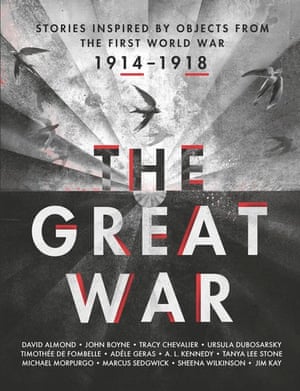The Great War: stories inspired by objects from
the First World War
(Walker Books, 2014)
304 pages,
with full page black and white illustrations by Jim Kay; 11 stories
by David Almond, John Boyne, Tracy Chevalier, Ursula Dubosarsky, Timothée de
Fombelle, Adèle Geras, A.L. Kennedy, Tanya Lee Stone, Michael Morpurgo, Marcus
Sedgwick and Sheena Wilkinson.
Subjects:
World War One, England, France, short stories (Year 5-8)

Synopsis
This anthology
contains stories by English, American, French, Irish and
Australian authors. Each author uses a particular
object as the inspiration for a story about the First World War. The objects include
items belonging to individual soldiers – a helmet, a writing case, a compass.
Some are printed material: sheet music, school magazines, a recruitment
poster. There is a French toy soldier,
the nose from a Zeppelin bomb and a Victoria Cross and a Princess Mary gift box. One of my favourite items was a hand-painted
war time butter dish.
Some stories
are set in the present day (a school history trip to the battlefields), others
in the past. A number of them have girls as the main characters. One is a sort of ghost story. One is written
as a poem. Many are firmly based in family life. As in all anthologies, some stories work
better than others, but all are of a very high standard.
The pages at the end
of the book contain biographical information about the contributors and
pictures of their chosen objects. From the picture credits, you can work out
where most of the objects come from (many are held in the Imperial War Museum),
but I would have liked some more information about how the authors chose the
object they wrote about. (This article in the Guardian shows some of the objects.)
About the illustrator
Interesting
random facts: Jim Kay won the Kate Greenaway Medal in 2012 for his
illustrations for A monster calls by
Patrick Ness and was chosen by J.K. Rowling to illustrate the full-colour
editions of the Harry Potter series. Here they are!
Other books you might like:
War girls is another recent collection of war-related short stories. The curioseum, although not war- related, is another example of using museum objects to spark a story.
Things I didn’t know
The country you call home by John Boyne describes the fierce
debate amongst the Irish about whether they should support England in the First
World War, when for years they had been fighting to get England out of Ireland.
The words
that struck me most were from A world
that has no war in it by David Almond, a story about a long-running
neighbourhood feud. Near the end, the
narrator is talking about all the wars that feature on the news every day. “Are
we daft?” he asks. “Are we evil? Is it just the way we are? Are we acting out
something that started with our ancestors? Is it in our bones and blood? Do we
go to war because we’re in love with war? Will we be asking those damn
questions till the very end of time?”
The words
stayed in my mind because I think a lot about writing books about war for
children, and why we do it and what we are trying to say. Surely we want our
readers to reflect on the futility of war, but as David Almond says, the wars
just keep happening.

No comments:
Post a Comment